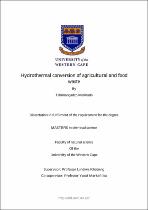| dc.contributor.advisor | Khotseng, Lindiwe | |
| dc.contributor.author | Makhado, Tshimangadzo | |
| dc.date.accessioned | 2022-05-11T08:14:24Z | |
| dc.date.available | 2022-05-11T08:14:24Z | |
| dc.date.issued | 2022 | |
| dc.identifier.uri | http://hdl.handle.net/11394/9087 | |
| dc.description | >Magister Scientiae - MSc | en_US |
| dc.description.abstract | The global dependence on non-renewable fossil fuels to meet energy needs cannot be sustained for a long time and it is already evident in the escalation of fuel prices over the past decade. This research was performed towards renewable energy production from agricultural and food waste. The use of agricultural and food waste has benefits such as being grown in a land that is not in competition with food crops protein, all year round availability, and having high lipid content. The produced bio-crude oil can be upgraded to remove moisture and acidity level, and can be used as a substitute for heavy oils such as diesel to power static appliances or can be used as petrol distillate fuel alternative.
Hydrothermal liquefaction (HTL) process is one of the commonly used technologies for converting agricultural and food waste into liquid biofuels. | en_US |
| dc.language.iso | en | en_US |
| dc.publisher | University of Western Cape | en_US |
| dc.subject | Hydrothermal liquefaction | en_US |
| dc.subject | Biofuels | en_US |
| dc.subject | Fossil fuels | en_US |
| dc.subject | Non-renewable energy | en_US |
| dc.subject | Bio-crude oil | en_US |
| dc.title | Hydrothermal conversion of agricultural and food waste | en_US |
| dc.rights.holder | University of Western Cape | en_US |

